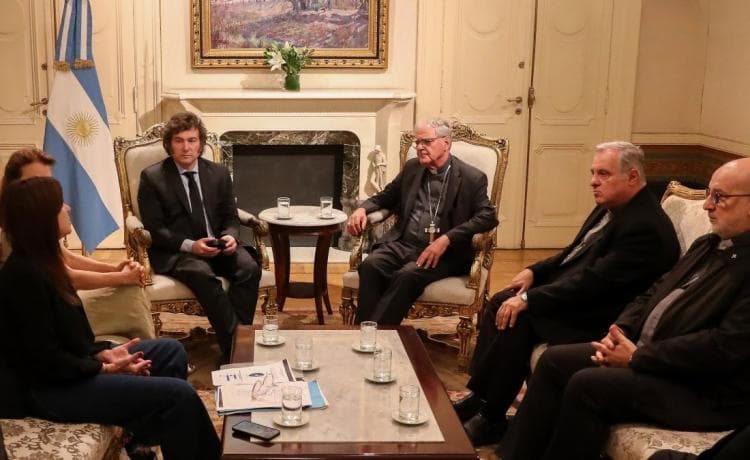SÃO PAULO, Brazil – Amid a serious economic crisis in Argentina and a poverty rate of almost 60 percent, ultra-libertarian President Javier Milei on March 12 received the heads of the bishops’ conference for his first meeting with the Church. He heard their concerns over the lack of food and medicines for the poor.
Since Milei took office in December, he has been implementing a number of measures that critics say intensified the hardships faced by the poorest in society.
In one of his first acts, he devalued the Argentinian peso by more than 50 percent, something that had the initial result of increasing the prices of most products. He has also cut the State’s expenditures, including those offering social relief.
In February, the annual inflation rate attained 276 percent, something that puts gives Argentina one of the world’s highest inflation rates. The monthly increase, however, corresponded to 13 percent, a rate significantly lower than that of January – which reached 20 percent. Milei celebrated the figure as a sign that his policies are working, something disputed by many analysts.
The episcopal delegation was led by Bishop Oscar Ojea of San Isidro, the conference’s president. The meeting should have taken place in December, but Milei postponed it – claiming that the beginning of his tenure was too demanding and that he needed some more time to adequately receive the Church leaders.
In a statement released after the encounter, the bishops say they shared with the president their concerns over the economic situation, “especially when it comes to the restrictions imposed on the vulnerable sectors that suffer, mainly with the lack of food and medicines.”
The prelates also told Milei about the challenges faced in several Argentinian provinces, which had been reported to them by other bishops.
They thanked the president for “attentively listening to their demands” and told him they’re ready to work side by side with him for the common good.
Since the presidential campaign, Milei and the Church have had several run-ins due to his repeated attacks on Pope Francis and on the Catholic social doctrine. An adherent of radical libertarianism in the economy, he defends the State’s minimum intervention in Argentinian society and criticizes the advocates of governmental incentives and social aid for the poor.
He has already called Pope Francis, his countryman, a “communist” for defending the legitimacy of using taxes to help the neediest.
His several attacks on the pope earned him the enmity of many Catholics, including large sectors of the clergy, who even campaigned against him.
His friendly encounter with Pope Francis in the Vatican on Feb. 12 apparently reduced the atmosphere of discomfort among part of the Argentinian Catholics, but the concrete impact of his policies on the lives of the poor have led many in the Church to keep a critical attitude towards him.
Father Mauricio Cardea, a vicar in the parish of Villa Celina, a poor neighborhood in La Matanza, on the outskirts of Buenos Aires, told Crux that “it’s noticeable how life has changed for the worse lately.”
“And the worst part is that one cannot identify any urgent measure being taken by the government to deal with that scenario,” he said.
A member of the team of “slum priests” – known as curas villeros – Cardea manages a refectory for the poor in his parish.
“But the number of people coming to us for food has grown so much lately that we had to open a new refectory,” he said.
The curas villeros are a group that works and lives in the poorest neighborhoods all over the South American nation.
Cardea explained that the current crisis leads everybody to lose in society.
“Many in the middle class became poor and many poor became indigent,” the priest said.
Most families are having to deal with difficulties sending their children to school and with sick elderly who are not receiving medicines from the government anymore.
“It’s a time of great disorder in communities and families,” he said.
Cardea said the Argentinian poor have always needed help from the government and from the social organizations. Without it, the situation might become unbearable.
Juan Romero, who heads a civic organization in a slum called Villa 31 – one of the largest in Buenos Aires – agrees with Cardea.
He said that the public refectory his organization runs can only serve 150 people, but more than 400 have been approaching them.
“More and more people have been telling us that they lost their jobs and that they need to eat,” he told Crux.
Romero said that a growing number of people have been living on the streets, some of them with their children.
“When we asked the government for more support, we didn’t receive an answer,” he said.
That has been one of the worst periods for Romero in 41 years of activity, he added.
“I don’t think we’ll see anything changing for the better this year,” he said.
Milei’s administration has already informed some curas villeros that the funds for their social activities supported by the government will not be readjusted this year. With the growing inflation, dining halls and other social works have been terribly in deficit.
“Thankfully, the poor have the strength needed to keep struggling,” Cardea said.















